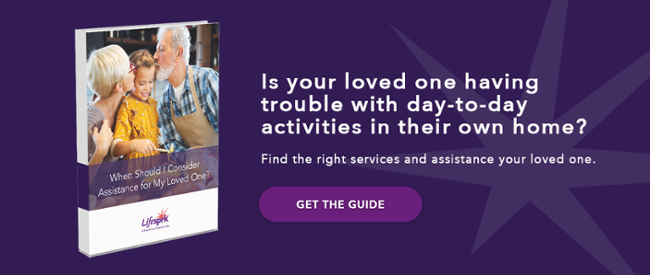
COVID-19 has changed life as we know. We now know that our senior loved ones with long- term health conditions are more vulnerable to complications related to the virus, so their daily care is especially important. We also know, despite there being a pandemic, aging magnificently is possible and we want to help you live the healthiest, most independent lives possible.
Caring for a senior loved one during the COVID-19 pandemic might feel overwhelming, particularly if you’re not usually a primary caregiver. However, following a routine, making yourself a priority, and keeping in touch with friends and family can help reduce stress and make the caregiving routine easier. Lifesprk is available to help guide you along the way to keep your loved one happy, healthy, and independent at home.
Look after yourself and take precautions
Self-care helps you be the best caregiver you can be; it’s important to take time to care for yourself, too, so you are fully ready to care for others. Maintaining a healthy lifestyle by eating a balanced diet, exercising regularly if you can, and getting a healthy amount of sleep are important. These elements are essential to boosting your immune system so that you can stay well and continue to care for your loved ones. It’s also important to be realistic and keep in mind that the pandemic is new for everyone, don’t be too hard on yourself as you adjust to a new daily routine.
If you’re looking after vulnerable loved ones, it’s especially important to take the recommended precautions seriously:
- Avoid crowds and maintain a 6-foot distance from other people. Practicing physical distancing does not mean they should be socially isolated during this time.
- Avoid coughing or sneezing, if you do use your elbow or a tissue — remember to wash your hands or use hand sanitizer afterward.
- Wash your hands thoroughly with antibacterial soap and hot water regularly, especially after going out in public.
- Keep regularly used surfaces in your home as clean as possible, disinfecting them on a regular basis. This includes handrails and any other mobility equipment used by your loved one.
Stick to a routine as much as possible
Maintaining a daily routine can help give you balance during days of isolation caused by COVID-19. Set a daily schedule that you and your loved one can easily follow. Try to get up at the same time each day, have regular mealtimes, and schedule some fun activities for you both to take part in.
A regular movie night, game night, meditation session, gardening day, or even just taking time to look at old photos, are all fun ways to pass the time. If your loved one usually lives in a senior living campus or receives community care, try to stick to their past routine and try to incorporate their previous activities as much as possible. Sticking to a routine and staying busy with activities is key to maintaining a sense of stability even in these challenging and uncertain times.
Have a plan in the event that your loved one becomes infected with COVID-19
Proactive planning can help reduce anxiety and fear in the event that your loved one becomes infected with COVID-19. It may be difficult for loved ones to express their exact symptoms so it’s important for you to notice any changes in health, particularly if they’ve experienced any cognitive decline.
If you have not done so already, it’s important to discuss how best to access your loved ones medical and financial information so you have it readily accessible should you need it quickly. Our free checklist provides valuable and quick answers to questions that many people may have in an emergency, especially if they are unable to speak.
Understand the symptoms of COVID-19 and check for a fever if you suspect your loved one might have come in contact with the virus. If your loved one is showing symptoms, it’s best to call your health provider right away and follow their advice.
Avoid heading directly to hospitals since they currently have strict policies in place to prevent the spread of the virus and are limiting the entry for people. If you feel that your loved one is in a life-threatening condition call 911 or if able, reach out to your healthcare provider for immediate guidance.
Make sure to create a plan for if you get sick. Create a list for who will provide daily care for your loved one and how you will self-isolate from the rest of the family. You should also compile a list of all of your loved one’s care information and details. Include information such as their medication, prescriptions, necessary care, and their doctor’s contact information.
Use technology to keep in touch with others for support
While we know that social distancing is essential, make sure that you are not isolating yourself from your support network. Staying in touch with people will help prevent loneliness and keep you feeling happy and motivated.
Reach out to close friends and family on a regular basis to check-in. Instead of calling or texting, try video calls like Skype, Facetime, or Google Hangouts for a more personal connection with the people you care about. It’s a good idea to try and check in with at least one person per day. Keeping in touch with friends and family will help to prevent feelings of social isolation and keep you connected.
How can Lifesprk help you care for your loved one during COVID-19?
Whether you’re caring for your loved one in person or at a distance, Lifesprk can help support you throughout the pandemic and beyond.
Aging magnificently is possible and Lifesprk is ready to help guide you to help keep yourself and your older loved ones safe, healthy, and living life now through this pandemic and beyond.
Call us at 952-345-0919. If you need immediate support at home or guidance, please reach out to our team directly for a free consultation.



